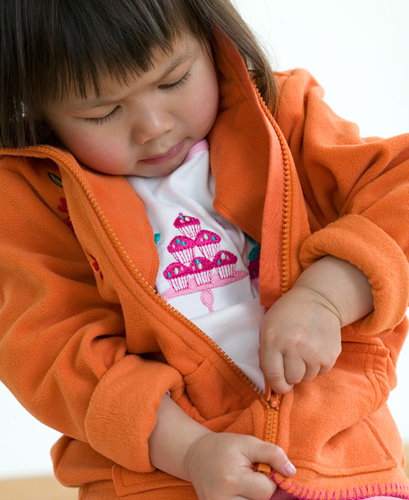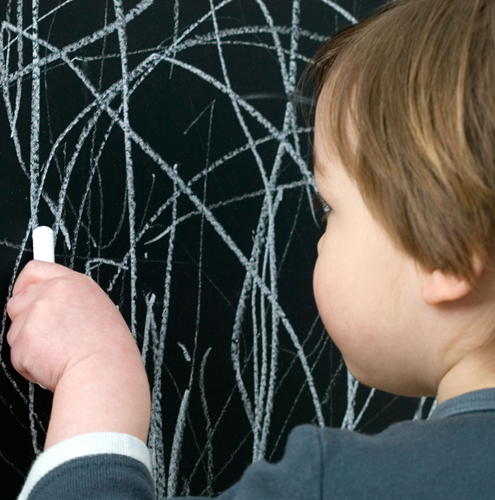Your skillful toddler
By the age of two your
toddler will be far more steady on his feet, and as well as walking,
will gradually discover new ways of getting around, such as running,
climbing, jumping, and hopping. He is now able to hold a pencil in a
writing position, can manage door handles, some buttons, zippers, and
lids. He will also start to draw this year, and will enjoy turning the
pages of books while he looks at the pictures. Throughout the next year
he will become more confident and more physically coordinated. It is
largely through his physical skills that he will experience the world
and the more time he can spend outside in the open air the better.
Children of this age are starting to enjoy gentle rough-and-tumble
games, piggybacks, playing horsey (usually with a willing adult on all
fours and playing the horse!), and being swung around and around
(safely).
Your toddler’s
movement skills and coordination will really start to take off now. His
brain will be sending messages a lot faster, and so his movements will
look more spontaneous. By the end of the year, he will be able to walk
backward, change direction when walking and running, and he will be
carrying himself differently. He will have lost the rolling gait of a
toddler and will have learned to walk in a confident way.
Letting her learn
Getting ready to go out may take three times longer these days;
however, it is important to be patient and give your child opportunities
to help with tasks such as dressing herself.

Social development
Toddlers of 24–36
months are a bundle of mixed emotions and are still very egocentric and
self-interested. However, they are becoming much more interested in
children their own age and will happily play alongside another child for
a while—before falling out. Differences of opinion among playmates can
be fairly vocal, physical, and frequent. Toddlers are great imitators
and will be keeping a watchful eye on those around them to learn how to
do new things. Their belief that everything is “mine” and that “everyone
experiences life the way I see it” will inevitably lead to tantrums and
misunderstandings. However, your toddler is learning fast. It may
surprise you to find out from a babysitter that he is perfectly well
behaved when you are not around. A lot of his behavior is about
experimentation—and trusting that you will be there to save him if
things go wrong.
Signs that development is on track
It is important to emphasize that each child will develop at his own pace, and rarely in a steady upward line . The following is an approximate guide to how new skills will develop in the coming months.
By the end of months 24–27, your child:
May be able to use as many as 50 single words and will be able to understand as many as 300.
Will be able to combine two words or more in a phrase.
May be able to follow a simple two-stage instruction.
Can probably take off one item of clothing.
May be starting to try to get dressed.
May be able to jump.
May be able to wash his hands.
Can use a cup with few spills.
By the end of months 27–30, your child:
Can probably put on an item of clothing.
Will be able to name as many as six body parts.
May be able to recognize as many as four images by pointing.
Can probably jump.
May be able to name a friend.
May recognize himself in a photo.
By the end of months 30–33, your child:
Using his hands
Fine motor skills are developing but no clear hand preference is
shown before the age of three. Before this using either his left or
right hand, or both, is fine.

May be able to build a tower, six blocks high.
Will probably be able to wash and dry his hands.
May be able to say one or two sentences in short conversation.
Can stand on tiptoe when shown.
Can often draw circles, lines, and dots.
May show signs of being right- or left-handed.
Will notice small details in picture books.
Will know his full name.
By the end of month 36, your child:
Will be able to name at least four images.
Will be able to wash and dry his hands.
Will be able to brush his teeth, with help.
Will be starting to use prepositions in speech such as “on,” “in,” “under,” and “over.”
Helping your child to deal with strong emotions
It is an
important part of social development to be able to experience all kinds
of feelings, from joy to rage. Understanding that the feelings will
pass, and can be controlled, will in time provide your child with tools
to self-manage his emotions.
Watch for signs of personal frustration, especially if he is prone to biting, hitting, or screaming.
Try
not to lose your cool. Give a clear instruction to stop the behavior,
but don’t be drawn into explaining why he must stop. He is too young to
understand.
Tell your child how he is feeling so he starts to learn the language to describe his feelings.
Divert your child’s attention with an activity rather than focusing on the negativity.
Be realistic: problems are more likely when a child is tired, hungry, bored, or overexcited.
You may need to remove an angry and aggressive child from the situation for a calm-down period.
Safety note
Toddlers are very
accident-prone and have little judgement. Water hazards are particularly
dangerous to a young child, since he cannot hold his breath or right
himself easily if he falls. Roads are another obvious danger. It is
essential that a toddler is supervised by an adult at all times.
How you can support memory development
Your toddler will be getting better at remembering, but there are ways you can help him:
Children learn mainly through personal experience, so hands-on learning is always a good idea.
Strengthen
memory by encouraging the use of more than one of the senses, for
example songs to help learn words; the smells of cooking to explain the
name of foods.
Encourage his understanding of time by looking at photos and discussing past events—“When you were a baby we…”
Read his favorite story and pause before naming a favorite character or phrase to allow him to fill the gap.
Give
information in short chunks—say, “Get your socks” rather than “Get your
socks, and then find your ball.” He may only remember one instruction.
Do not expect your child to be able to tell the time. He does not yet have reasoning skills.
Give
him extra information to help him understand the concept of time and
ground his memories. For example, when talking about doing something
“tomorrow,” remind him that it means: “When you wake, then it will be
tomorrow, and then we will go to the park.”